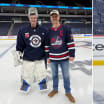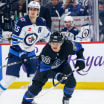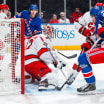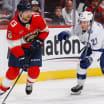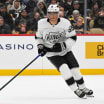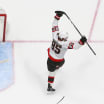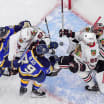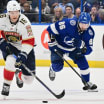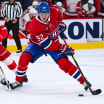Reirden excited for 'challenge' as Capitals coach
Talks transition from associate, Ovechkin and defending the Cup in wide-ranging conversation with NHL.com
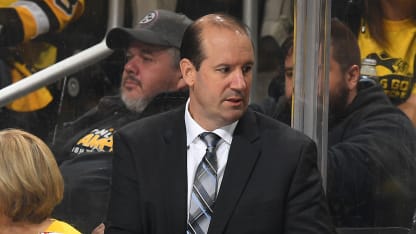
© Joe Sargent/Getty Images
Now Reirden is eager to get started with the Capitals, who will look to repeat as Stanley Cup champions after winning it for the first time in their 43-season history last season.
"I worked hard and sacrificed a lot for this opportunity, and it's an exciting one for sure, especially given how things finished last year with winning the Stanley Cup," the 47-year-old said. "Going into that situation is something that's different and unique and that will be a good challenge for myself and for our team as well. It's really an exciting time."
When Trotz resigned June 18 after being unable to agree on a new contract, Reirden was the obvious choice to fill the vacancy. He spent the past four seasons with Washington coaching under Trotz (two seasons as an assistant and two as associate) and four seasons prior to that as an assistant with the Pittsburgh Penguins.
As a result, Reirden takes over a team he knows well with only fourth-line center Jay Beagle (signed with Vancouver Canucks) and backup goalie Philipp Grubauer (traded to Colorado Avalanche) gone from the lineup that dressed for the Capitals' 4-3 Cup-clinching win in Game 5 against the Vegas Golden Knights on June 7.
With his first training camp as an NHL coach approaching, Reirden sat down with NHL.com to discuss taking over the Stanley Cup champions, what changes he might make, and what captain Alex Ovechkin has to do repeat last season's success:
On the most difficult part of taking over a team that won the Stanley Cup last season: "I think one of my strengths as an assistant is I've been able to have a strong pulse of when the players need time away, when they need to be pushed harder. In terms of those type of things, with it being a longer [Stanley Cup Playoff] run (last season), it's important to have a strong pulse on your team and your leadership group in particular and know when to push and when to pull back a little bit in terms of where we're at energy-wise. Those are things that I've already made adjustments to (in) our overall schedule that's planned out, with travel situations or different things we can do to make sure we're fresh to be able to give ourselves every chance we can to repeat.
"This is an interesting challenge in that it's not in a playbook. It comes through feel and intuition and your pulse of what your players are going through. I've done my research through various teams and done some research through other sports as well, and it's something that you have to be aware of and you have to monitor."
On how he's prepared this summer for his first training camp as head coach:"A lot of phone calls with all the players and getting the game plan moving forward with our group. That was important to touch base with them, and to get the coaching staff in place with hiring two new guys (assistants Scott Arniel and Reid Cashman). That was important and took quite a while to make sure that we got the right type of people. Then just making some small adjustments in our locker room and some different things. But things were in a good place going into this situation, so a lot of it's going to be continuing the same things."
On if Alex Ovechkin, who turns 33 on Sept. 17 and became a father on Aug. 18, is hungry to win again and can repeat his regular season (led NHL with 49 goals) and playoff success (won Conn Smythe): "Yeah, I think that's the challenge that's out there for Ovi. He came to camp last year in good shape and I think it wasn't by accident that he was able to have the start that he did. So that's something that's been discussed with him, and just to make sure to continue to maintain and stay committed to that type of conditioning throughout the year to really set him up to be able to have success in the long run for us. That's the best two-way hockey that he's played. He's obviously an elite talent in terms of how he scores goals, but I thought his leadership and his commitment to two-way hockey was a difference maker for us.
"He did an outstanding job, and I think that he's probably one of the ones that saw the impact that bringing the Stanley Cup home can have as the first Russian captain ever to have won the Stanley Cup. I did talk at length with him about that and how special that was prior to his Cup day and what he's done for that country, and bringing that home and sharing that with them is an amazing experience and you see that not just having an effect on him, but it had an effect on an entire country, which was great. I think he not only sees the difference he can make by having that success, but also the difference he can make to our team when he is playing like he did throughout the playoffs, which is the most committed I've seen."
On knowing the players already on team and within the organization: "It's definitely an advantage going into this situation. There's very few examples in the history of hockey of where you're able to know the personnel and win the ultimate prize and then be taking over as the head coach. So I've seen these players at their best. More often than not, if you're in an organization or a place that you've already gone through some things, that most likely ended on a negative tone with your players, and this is the exact opposite. So we're going to continue to push the envelope and continue to help us understand how we had success at the end because I was a part of it."
On if he'll change anything systematically:"I would say 5-on-5 for the most part we're going to stay with the majority of the things we did to end last year. In particular, I would say from the 63 to 65-game range on we really adjusted a few things that helped us defend better and set us up for better success defensively and our numbers followed, especially in the playoffs. So those things for the most part 5-on-5 will stay. … There will be some adjustments a little bit in some areas. Special teams in particular in the penalty kill area would be something that we'll be making some adjustments to. But for the most part the power play was excellent in the playoffs, and another top seven to 10 year for the power play (seventh in NHL at 22.5 percent last season)."
On being ready to be an NHL coach: "I definitely feel like I'm ready. I feel like I was ready a couple of years ago when I was going through some other (NHL coaching) opportunities. At that time, I felt I was ready, and that interest that I had elsewhere I feel like it really helped probably heighten my excitement for the possibility and really spend the last couple of years preparing as if I was going to be the head coach. Lots of situations I went through I was like, 'What would I do in this situation?' Or, 'That was a really good point. That was something I've got to remember because that worked well or this didn't work well.'"
On transitioning from being the well-liked assistant to coach:"I think the players understand, whether it's through the power play or working with the defense or doing pre-scouts or postgame video, that my approach is passionate, energetic and honest and it's a fair message where players are held accountable. But they also have a clear vision of what is right and what is wrong and try to eliminate the gray area for sure with our team, and that's something I'll continue to build on.
"The final say on things will be a little bit different, but [Trotz] did a really good job of delegating responsibility for all those situations."
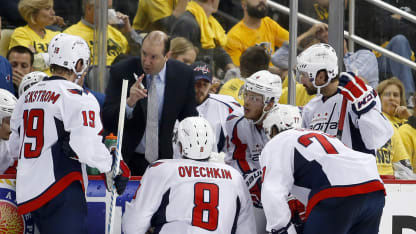
© Justin K. Aller/Getty Images
On if he's a player's coach: "I would say that everyone has to be a player's coach in some respects today to be able to maximize the players. I think some of the success I've been able to have in the development of players over the last eight, nine years has been off of being able to relate to different players and put them in a situation where they're in a challenging environment, but also enjoy coming to work. So if that makes you a player's coach, I guess I don't totally know the definition of it, but I think that with today's player you have to be cognizant of the player and understanding that they're looking for guidance, and you have to create relationships and have to have communication with them to be able to help push them in the right direction."
